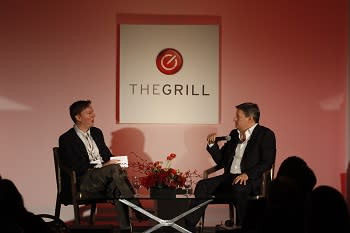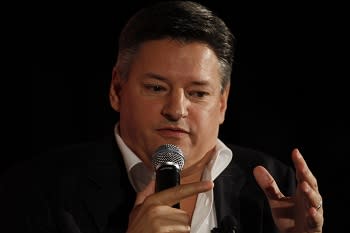'Arrested Development' Season 4 Footage Premieres at TheGrill
Attendees of TheWrap's annual conference TheGrill received a special treat Tuesday, as Netflix chief content officer Ted Sarandos exclusively premiered footage from the highly anticipated season 4 of "Arrested Development," which will premiere on Netflix early next year.
"At least the people in this room know that 'Arrested Development' is really happening," Sarandos cracked. After cautioning the audience to shut down their electronic devices and set aside their Twitter accounts, Sarandos premiered a clip featuring Buster Bluth (Tony Hale) helping his mother Lucille Bluth (Jessica Walker) smoke a cigarette, after the ankle-bracelet monitor she's wearing under house arrest prevents her from wandering outdoors. (While Sarandos noted that the footage won't be posted online anytime soon, trust us; it's hilarious.)
Also read: Where Hollywood Sees Art, Silicon Valley Sees "Bits and Bytes"; Who's Winning? The sneak peek at "Arrested Development" came during a wide-ranging discussion with moderator Brent Lang, a film reporter for TheWrap, as Sarandos discussed Netflix's leap into original programming, its relationship with cable operators and its ongoing evolution into "a television network on steroids."
Asked by Lang about Netflix's decision to create its own content (the Steve Van Zandt mobster drama "Lilyhammer" debuted this year, with a number of titles -- including "Arrested Development," the Kevin Spacey-starring "House of Cards" and the new Jenji Kohan project "Orange Is the New Black" -- premiering next year), Sarandos said that the escalating expense of producing one-hour dramas threatened to put a hole in Netflix's inventory. And provided an opportunity at the same time.
Also read: TheGrill: Hollywood's Finest at the Opening Cocktail Party (Photos) "I was concerned over the long haul that there wouldn't be a lot of post-season one-hour dramas to buy," Sarandos explained of the network's decision to dive into original content.
The question of cost was also prominent during the discussion -- specifically, whether it's a worthwhile risk for Netflix to invest in original content, to the detriment of its overall service. Sarandos noted that Netflix works on a different model than networks, with opportunities to more efficiently tailor its original content to its subscriber base. Sarandos said that before going forward with "House of Cards" -- an adaptation of the British series, which is being executive-produced and directed by "Fight Club" director David Fincher -- Netflix was able to hone in on how many of its subscribers had seen and enjoyed the original UK production, as well as previous Fincher movies and titles featuring Spacey, based on subscriber data. "If we can address that audience pool, the only risk is that the show is mediocre," Sarandos offered. "Then we can back into the economics." Another advantage that Netflix has over its network competitors, Sarandos said, is that it applies a longer-term model for its programs, which eliminates the pressure that network offerings feel, where if a show isn't a success within two episodes, it faces the chopping block.
"Creating stakes like that for content doesn't make sense to me," Sarandos said. "The show is not uniquely valuable at Wednesday night at 8 o'clock [under the Netflix model]; it's valuable for as long as the license agreement [is in effect]." Also on the topic of license agreements, Sarandos addressed the topic of Netflix's recent loss of much of A&E Networks' programming after the licensing agreement expired without being renewed. Sarandos explained that the matter of exclusivity is to blame for the loss of content on its streaming service, at least for now. (An individual familiar with the negotiations between A&E last month told TheWrap last month that both sides are working toward a new deal.) "I think that every time we don't do a deal, it's characterized that we lost it," Sarandos said. "We're gonna have breakdowns with the provider over what we see as the value of the product."
A&E content, he noted, is "very accessible on TV. If I turn on the television right now, there's a pretty good chance that 'Storage Wars' is on." That accessibility, Sarandos said, "lowers the viewing hours with the lack of exclusivity." As for whether Netflix, with its ever-expanding streaming content -- and, now, expansion into original content -- will find itself at odds with cable providers, Sarandos was optimistic that they can maintain a symbiotic relationship. "There's no question that we're complementary to cable in almost every way, but the most complementary way" is that the company is able to compel customers to pay more for broadband in order to access Netflix, Sarandos said. "We have a great app for broadband -- consumers are much more willing to upgrade their broadband than they are their video packages, and that's great for cable operators," he added.
Related Articles:
Where Hollywood Sees Art, Silicon Valley Sees 'Bits & Bytes'; Who's Winning?
Thanks to Twitter, Hollywood and Silicon Valley Are Finally Working Together
Chris Sacca and Jeff Jordan Talk Smart Venture Capitalism at TheGrill (Video)


